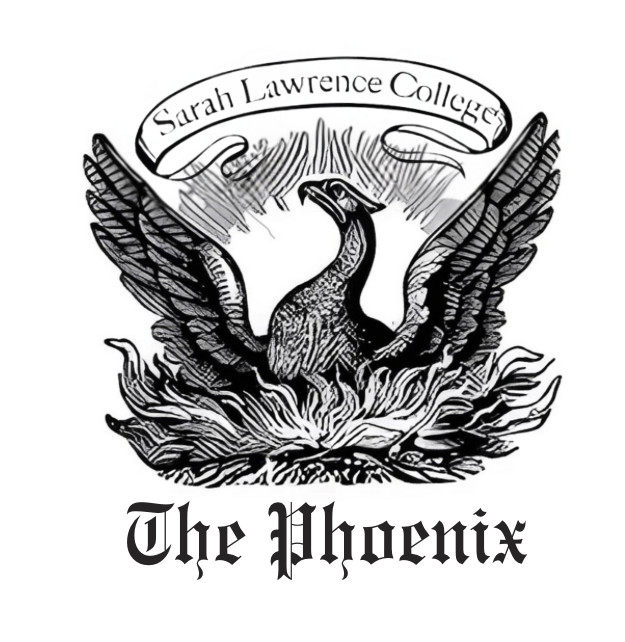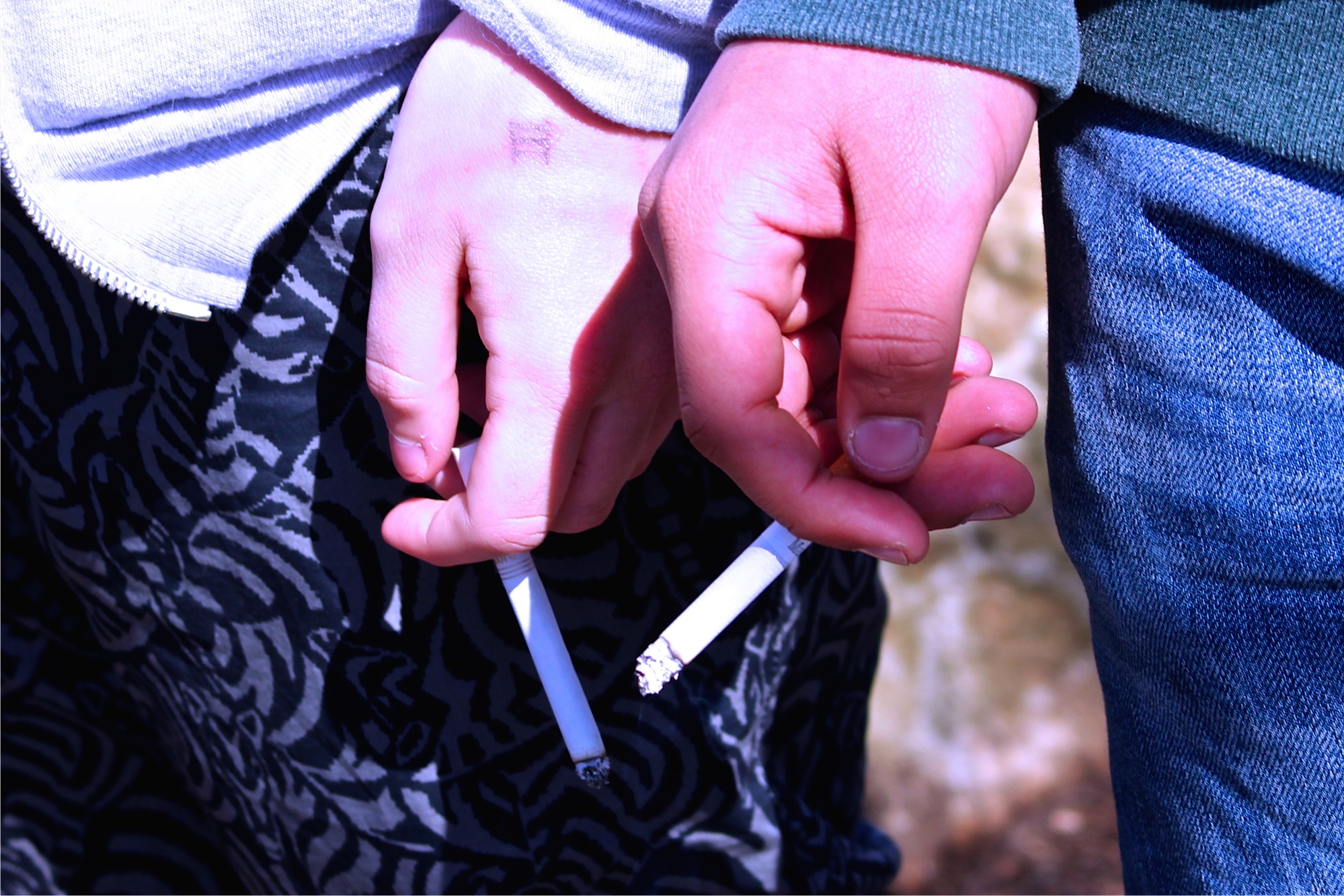Bye bye, butts: college will implement a new 'Smoke-Free Policy' in August 2015
comic by Vasaris Balzekas '17 - sbalzekas@gm.slc.edu - www.vasarisbalzekas.com
On February 10, 2014, President Karen Lawrence sent an email to the entire campus community formally announcing the new Smoke-Free Policy that the college is set to begin implementing in August 2015. The decision was the result of a recommendation made by the Smoking Policy Task Force, an Ad-Hoc Committee chaired by Polly Waldman, after a ten-month long examination process that began in April 2012.
The request for the creation of the separate committee, which was comprised of students, faculty and staff, arose out of several issues with the current policy on campus regarding smoking. These included students, faculty and staff not abiding by the policy as it is now, and the main problems of second-hand smoke and litter on campus that resulted. Along with considering various other strategies for moving toward a healthier campus atmosphere, the task force also spent the examination period determining the feasibility of becoming a smoke-free campus.
Under the current smoking policy at Sarah Lawrence, smoking is prohibited inside any college building or residence hall (which is also illegal under New York State Law), as well as within twenty-five feet of any college building or campus walkway. Fines for violating the policy range from $50 to $100, depending on whether or not one is inside a residential building. Though attempts are made to keep certain areas, like the patio of The Pub and the front of the library, specifically smoke-free, these efforts are often unsuccessful.
The director of the task force, Polly Waldman, noted how, “We took the existing policy, and a map of the campus…there were very few places that you could actually smoke and be completely adhering to the policy. Part of what was not working with this policy was it is very hard to enforce.” Mary Hartnett, Director of Medical Services and fellow member of the task force continued, “It’s a very unclear policy. We definitely, as a group, came to consensus that we believed that this policy, as it was currently written, was not working.”
In the process of forming strategies to make the smoking policy of this school more effective, one of many factors examined by the task force was how other comparable colleges and universities have dealt with smoking on their campuses. One comparable institution, Vassar College, is similarly moving towards adopting a smoke-free policy in the fall of 2015. Another comparable institution, Connecticut College, has a twenty feet rule as well as designated areas. Both NYU and Barnard College already have smoke-free campuses, and public institutions in the state of New York, such as the CUNY and SUNY schools, are required to be smoke-free under state law.
There were several different options considered within the task force throughout the process, which initially ranged from assigning designated areas around campus in which people would be able to smoke, to building new structures such as gazebos for smokers to use, to banning smoking altogether. These options were eventually narrowed down to assigning designated areas or going completely smoke-free.
Along with weekly meetings for the task force, two town hall meetings were held to hear opinions from other members of the community in late October. Along with the town hall meetings, a survey was circulated throughout the campus community in the fall of 2012, and garnered responses from 1,011 students, faculty and staff. In terms of tobacco use at Sarah Lawrence, the survey found that 53% of students never smoke, while the statistic was 85% for faculty and 78% for administrators, staff and vendors. The survey also included a question on the perceived amount of smoking on campus, which was seen to be higher than the actual level of tobacco use.
Ellie Brumbaum '17
While 85% of respondents agreed that they were bothered by second-hand smoke on campus, 42% of respondents still agreed that the current policy should remain, and 27% of respondents preferred designated outdoor areas. Only 20% of respondents favored a smoking ban on campus. In terms of how the community will respond to a smoke-free campus, while 40% of students who responded to the survey said that they would abide by the policy, 49% said that they would find ways to use tobacco anyway, and 8% said that they would consider changing schools.
Despite the fact that a minority of those who responded to the campus-wide survey favored a smoke-free policy, the task force still decided upon a smoking ban in mid-February of 2013 as the best way to move towards a healthier campus environment. Reflecting on the decision, Polly Waldman said, “Our goal, for our policy, was not to reform smokers, but to protect the rights of all people not to have exposure to second-hand smoke.” President Karen Lawrence agreed with this sentiment, saying, “No one is trying to radically change the Sarah Lawrence culture, they just want to breathe,” and that, “the focus of the committee was not moralistic.” Polly Waldman continued, “I don’t see it [the policy] as a limitation of people’s civil rights, I actually see it as a progressive move toward protecting or at least recognizing everybody’s right to clean air.”
Reaction to the policy among students, as well as faculty and staff, has been mixed. Nate Montalto ‘15, chair of the undergraduate student senate, said that despite this split, the appropriate response would be for the entire student body is to accept the policy. Discussion in senate has been geared toward, “how can senate help, what can senate do...this is going to be a policy, so how can we make it as equitable and fair as possible.” On the possibility for student action against the policy he said, “To be honest, the time for organization and students providing their voices was last year.” The Smoke-Free Policy Implementation Committee, directed by Mary Hartnett and devoted to the enforcement of this new policy, has already begun meetings in preparation for the policy change.
Ellie Brumbaum '17
Despite the fact that this decision is finalized, there have been various criticisms on the policy itself, as well as the process by which it was decided upon. Many have pointed out the possibility that this policy will lead to an increase of smoking within residence halls, or around Kimball Avenue. Junior class president Owen Marks ’15 expressed concern about public safety, saying, “I think that there should be various things that should be implemented to stop smoking, but I don’t know if this is the way to do it, because in the short term, I think it’ll decrease public safety, which should be a primary concern of the administration.” Fellow student Emily Rogers ‘15 also found it problematic that the survey results were reported after the final decision came out and felt that, after attending at the town hall meetings, a complete ban on smoking had not seemed like a possibility. “What I think is very misleading, is to say that there was student representation, student voices were heard, et cetera, when we clearly see the survey results weren’t really taken into account, they were misinterpreted, and that only one student was present for the majority of these meetings.” Marks continued on this note, “I think the administration has a rhetoric of having a very organic process and they want to try to show that off, but I think in reality it’s becoming a very top-down process from some of the policies that are being implemented. The smoking policy is just one example of that.”
Megan Gilbert ‘15, who was one of the student members on the task force, said that, “Looking back, it seemed like being smoke-free was the goal and we were finding research to back up that idea,” but still acknowledged, even as a smoker, that the current policy needed to change. “In my opinion, if the policy causes more than one person to go to the hospital, which it definitely did, we should change it.” She still added, however, “I’m still not comfortable with the decision to ban smoking completely,” and continued to say, “We shouldn’t have made the decision as quickly as we did. I personally think it needs to be revisited.”
by Janaki Chadha '17
jchadha@gm.slc.edu



